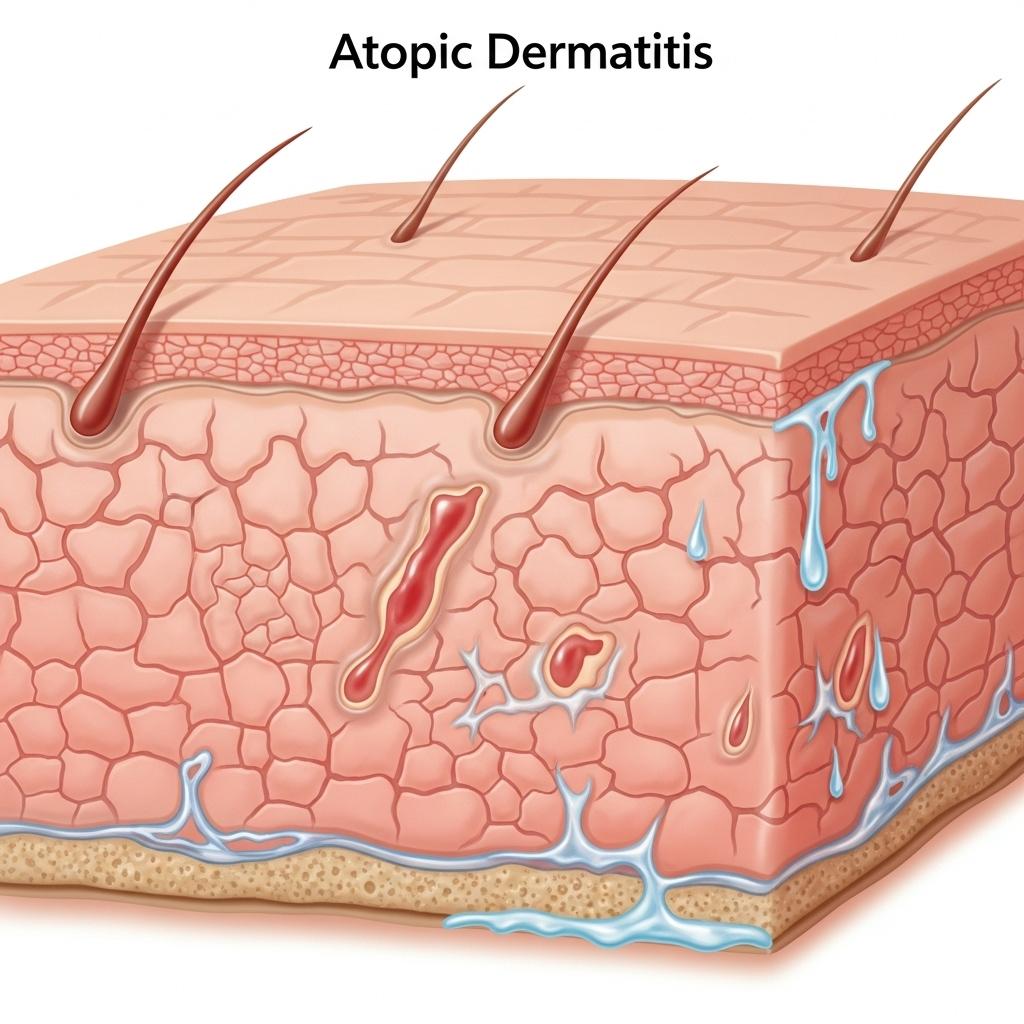Understanding Atopic Dermatitis: Immune Dysregulation and Skin Barrier Defects

Atopic Dermatitis (AD), also known as atopic eczema, is a chronic, relapsing inflammatory skin disorder affecting millions globally. Often beginning in childhood but persisting or recurring in adulthood, AD is marked by intense pruritus, dry skin, and eczematous lesions. Far beyond a surface-level condition, AD reflects a complex interplay of genetic predisposition, environmental triggers, skin barrier dysfunction, and immune dysregulation.
Request a sample copy of the CI report at: https://www.datamintelligence.com/strategic-insights/ci/atopic-dermatitis-ad
Pathophysiology: A Skin Barrier and Immune System Breakdown
The pathogenesis of AD involves both structural and immunological components:
1. Filaggrin gene mutations impair the skin’s barrier function, increasing transepidermal water loss and allergen penetration.
2. Type 2 helper T cell (Th2) skewed immunity promotes cytokine release (e.g., IL-4, IL-13, IL-31), contributing to inflammation and itch.
3. Microbiome imbalances, particularly Staphylococcus aureus colonization, exacerbate flares.
This dual dysfunction results in chronic itch-scratch cycles, epidermal damage, and heightened sensitivity to environmental allergens and irritants.
Clinical Presentation and Impact
Atopic Dermatitis presents with:
* Erythematous, scaly plaques
* Lichenification due to chronic scratching
* Flexural distribution in older children and adults
* Facial and extensor involvement in infants
Severe cases can significantly impair sleep, mental health, and social functioning. AD is also frequently associated with other atopic conditions such as asthma, allergic rhinitis, and food allergies, a phenomenon referred to as the atopic march.
Treatment Landscape: From Emollients to Targeted Immunomodulation
Management of AD is stepwise and individualized, based on disease severity:
1. Mild-to-Moderate Disease:
2. Moisturizers and skin barrier repair creams
3. Topical corticosteroids and calcineurin inhibitors (e.g., tacrolimus, pimecrolimus)
4. Antihistamines for pruritus (though often limited in efficacy)
5. Moderate-to-Severe Disease:
Systemic therapies such as cyclosporine, methotrexate, or azathioprine (off-label)
Phototherapy for widespread involvement
Biologic Therapies: A Paradigm Shift in Severe AD
The introduction of biologic agents has redefined treatment goals for moderate-to-severe AD:
* Dupilumab, an IL-4Rα antagonist, blocks IL-4 and IL-13 signaling, offering significant symptom relief and improved quality of life.
* Tralokinumab (IL-13 inhibitor) and lebrikizumab are newer additions with promising efficacy.
* JAK inhibitors (e.g., upadacitinib, abrocitinib) offer oral targeted options, though they carry safety considerations such as infection and lipid abnormalities.
These therapies represent a shift from symptom suppression to immune axis correction, allowing for longer-term disease control.
Pediatric and Geriatric Considerations
Children require special attention due to:
* Delicate skin and heightened risk of side effects from topical steroids
* Impact on growth, development, and psychosocial well-being
* In elderly populations, overlapping diagnoses (e.g., contact dermatitis, xerosis) complicate management, and polypharmacy increases risk of adverse *** interactions.
Request a CI consultation at: https://www.datamintelligence.com/strategic-insights/ci/atopic-dermatitis-ad
Real-World Challenges
Despite therapeutic advances, gaps remain:
1. Access to biologics is limited by cost, especially in low- and middle-income countries.
2. Delayed diagnosis and under-treatment persist due to lack of awareness or misidentification as simple dry skin or contact dermatitis.
3. Treatment adherence is often poor due to fear of steroid use or frustration with chronicity.
4. Patient education, multidisciplinary care (including dermatologists, allergists, and psychologists), and supportive follow-up are essential for optimal outcomes.
About DataM Intelligence
DataM Intelligence 4Market Research LLP delivers real-time competitive intelligence across autoimmune, immunologic, and rare disease spaces. Our insights span clinical pipelines, regulatory benchmarks, and commercialization strategies for stakeholders in global life sciences.
🔗 Visit: www.datamintelligence.com
- Art
- Causes
- Crafts
- Dance
- Drinks
- Film
- Fitness
- Food
- Games
- Gardening
- Health
- Home
- Literature
- Music
- Networking
- Other
- Party
- Religion
- Shopping
- Sports
- Theater
- Wellness


